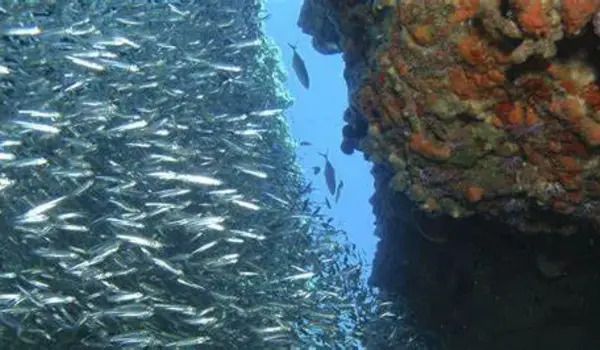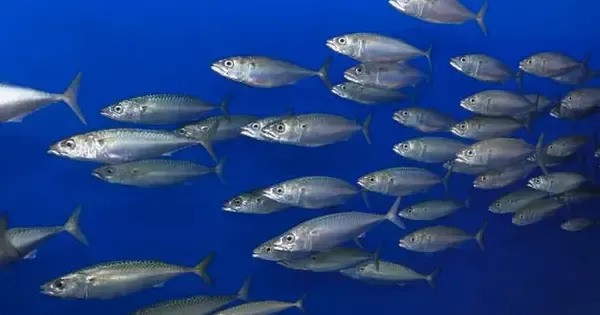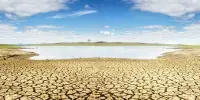According to a new study from the University of Tokyo, fish weight in the western North Pacific Ocean fell in the 2010s as temperatures rose, reducing food availability. Researchers examined the individual weights and total biomasses of 13 fish species. Between the 1980s and 2010, the fish were lighter. They ascribed the initial period of weight loss to an increase in Japanese sardine populations, which increased competition with other species for food.
While the quantity of Japanese sardines and chub mackerel increased moderately in the 2010s, climate change’s warming of the ocean appears to have resulted in more competition for food, since colder, nutrient-dense water could not easily ascend to the surface. These findings have significance for fisheries and governments working to manage ocean resources under future climate change scenarios.
Whether it’s sushi, takoyaki (traditional octopus pancake balls) or grilled mackerel, seafood is an iconic and important part of Japanese cuisine. Japan’s seafood self-sufficiency has, however, been gradually declining for several decades. Local fisheries face multiple challenges from reduced sales and lower prices, to labor shortages, changing consumer preferences, and soaring costs. But perhaps one of the biggest threats comes from global warming.
We investigated 17 fish stocks — that is, populations or groups of fish — from 13 species and discovered that many of them lost weight during this time.
Professor Shin-ichi Ito
Japan’s eastern coast is flanked by the western North Pacific Ocean, a highly productive marine environment. According to the United Nations Food and Agriculture Organization, in 2019, the western North Pacific accounted for over a quarter of all fish captured and sold worldwide. However, new research from the University of Tokyo shows that fish weights in the region altered drastically between the 1980s and the 2010s.
“We investigated 17 fish stocks — that is, populations or groups of fish — from 13 species and discovered that many of them lost weight during this time,” revealed Professor Shin-ichi Ito of the Atmosphere and Ocean Research Institute at the University of Tokyo.
Ito, along with co-author Lin Zhen, a PhD student, analyzed fish weight and biomass data from Japan’s Fisheries Agency and the Japan Fisheries Research and Education Agency. Fish weight refers to individual fish (for example, a 200-gram mackerel), whereas biomass is the total weight of a species or group in an area (for example, 50,000 tons of mackerel).

The pair looked at long-term data for six fish populations from four species between 1978 and 2018, and at medium-term data for 17 fish populations from 13 species from 1995/1997 to 2018. Seawater temperature data between 1982 and 2014 were also studied to see if changes in the ocean’s surface and subsurface layers may have had an impact.
The data revealed two phases of lower fish body weight, the first in the 1980s and the second in the 2010s. The team ascribed the 1980s weight loss to an increase in Japanese sardine, which likely resulted in increased competition for food among and between fish species. In comparison, while the population of Japanese sardine and chub mackerel increased moderately in the 2010s, the team’s analysis appeared to show that reduced nutrient supply to the ocean’s surface from subsurface layers, caused by global warming’s effect on the ocean, was an influential factor.
“With higher temperatures, the ocean’s upper layer becomes more stratified, and previous research has shown that larger plankton are replaced with smaller plankton and less nutritious gelatinous species, such as jellyfish,” explained Ito. “Climate change can alter the timing and length of phytoplankton blooms (explosive growth of microscopic algae at the ocean’s surface), which may no longer align with key periods of the fish life cycle. The migration of fish has also been shown to be affected, in other studies, which in turn impacts fish interaction and competition for resources.”
Ito thinks that research like this would help fishery managers and policymakers better understand the changes occurring in the oceans around Japan, allowing them to make educated decisions for the future. “Fish stocks should be handled differently than they were previously, given the growing influence of climate-induced conditions. The situation for fish today is far worse than it was decades ago,” he stated. “If we do not stop global warming, the quality of seafood may deteriorate. So, we must take measures to ensure a healthy ocean and excellent fish.”
















